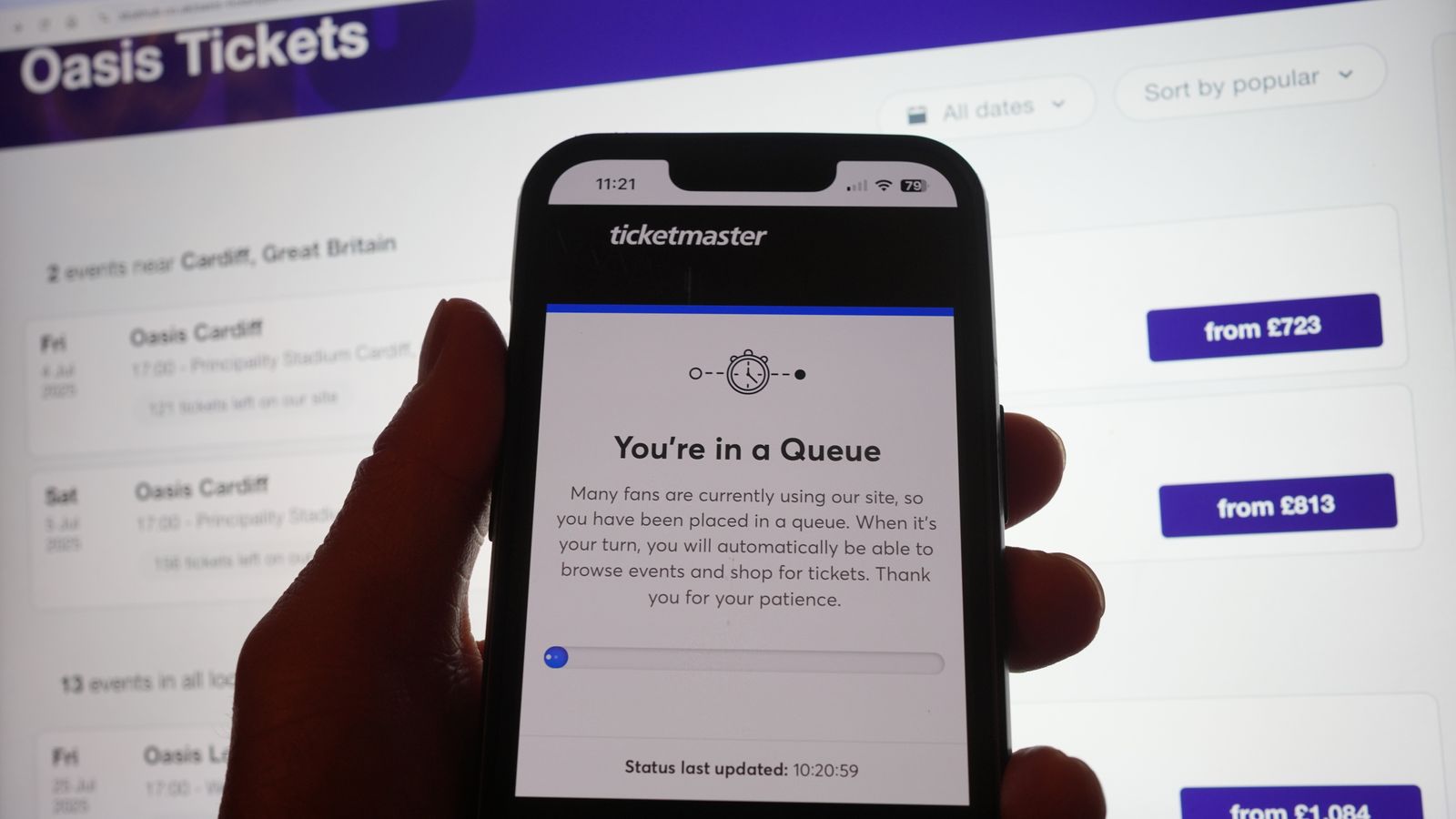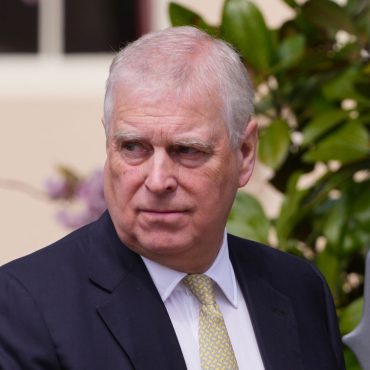The ticketing system for gigs, including next summer’s Oasis concerts, is “broken”, a senior executive at a resale site has told Sky News.
Matt Drew, who oversees business development at Viagogo, said Saturday’s sale of tickets for the band’s first gigs in 16 years “descended into chaos”.
Thousands of fans were left angry and frustrated in their efforts to buy tickets for the concerts in the UK and Ireland next July and August.
Many entered hours-long virtual queues to buy tickets on Ticketmaster, GigsAndTours, and See Tickets, only to find prices balloon into the hundreds of pounds by the time they could buy them, with others missing out completely.
Please use Chrome browser for a more accessible video player

3:04
‘Dynamic pricing’: What can be done?
While defending Viagogo, where tickets were advertised for more than £2,000 shortly after going on sale on the “primary market”, Mr Drew said: “It’s a system that isn’t fit for purpose.”
“It’s clearly broken, and bands and consumers are the ones that are losing out,” he told Niall Paterson on Sky’s Daily podcast.
“Asking fans in the first place to buy tickets so far in advance, you’re putting fans in massive queues, which are pre-queues to other queues, having them be kicked out of these services, having the price triple on them at the point of checkout – these are scenarios that just illustrate what a mess this is.
“That’s the reason why we believe this whole system needs a full review. It needs to be looked at from top to bottom and redesigned in a way that supports consumers.
“There’s a number of very clear and common threads that would be foundational to a better system – much greater transparency, much greater levels of competition.
“These exclusive points of sales are almost unique to this industry, and it’s clear that they don’t work. They cause crashes, they cause the ability for people to squeeze on price to eye-watering levels.”
Spreaker
This content is provided by Spreaker, which may be using cookies and other technologies.
To show you this content, we need your permission to use cookies.
You can use the buttons below to amend your preferences to enable Spreaker cookies or to allow those cookies just once.
You can change your settings at any time via the Privacy Options.
Unfortunately we have been unable to verify if you have consented to Spreaker cookies.
To view this content you can use the button below to allow Spreaker cookies for this session only.
👉 Tap here to follow the Sky News Daily podcast 👈
Mr Drew added that the use of dynamic pricing in the sale of Oasis tickets was different from other instances of its use in industries such as taxi rides because “it was a closed shop”.
“There is no competitive tension. So what that means is that people who are dynamically pricing the event can really do as they see fit.
“In terms of their pricing, they’re really just choosing a price and there’s no downward pressure or competitive tension pushing them in a different direction.”
What is dynamic pricing?
The demand-based system was introduced by Ticketmaster in 2022.
It said it was brought in to stop touts and ensure more money goes to the artists.
Essentially, when there is a lot of demand for tickets, and limited supply, the price can go up.
Amid anger over Oasis’s ticket prices, the company said it does not set prices and shared a link to a website that said costs could be “fixed or market-based”.
On its own website, Ticketmaster describes its “Platinum” tickets as those that have their price adjusted according to supply and demand.
It says the goal of the dynamic pricing system is to “give fans fair and safe access to the tickets, while enabling artists and other people involved in staging live events to price tickets closer to their true market value”.
The company claims it is artists, their teams, and promoters who set pricing and choose whether dynamic pricing is used for their shows.
Mr Drew also rejected criticism that Viagogo’s prices could not be justified, saying: “We run a ticketing marketplace… we don’t set prices.
“What we find almost all the time in these special cases with Oasis, with Taylor Swift, with Beyonce the year before is that there’s an initial flurry, there’s some crazy prices.
“They get listed, those tickets don’t sell, and over time the ticket prices smooth off, evolve down and end up in a place that’s reasonable and rational and ultimately set by the market.”
Read more:
Government promises review of dynamic pricing
Oasis tickets sold out as fans complain about surge in prices
Follow Sky News on WhatsApp
Keep up with all the latest news from the UK and around the world by following Sky News
Tap here
It comes as former minister David Davis told Sky’s Politics Hub with Sophy Ridge that the sale of Oasis tickets was “corporate Britain at its worst”, with fans “mistreated and ripped off”.
Mr Davis, who’s been a Tory MP since 1987, revealed he’d written to the Competition and Markets Authority about it to say “the rules are not working” and “this needs to be put right”.
“My hope is they will respond and do something about it. If they don’t, then we’ll have to pursue it further in parliament,” he added.
“These are digital shackles, a digital locked-in queue.
“You can’t get out, and that’s not how free markets work.”
Prime Minister Sir Keir Starmer has said the government will get a “grip” on the issue of surge pricing and Culture Secretary Lisa Nandy called the inflated selling of Oasis tickets “incredibly depressing”.
She said the government “will include issues around the transparency and use of dynamic pricing, including the technology around queuing systems which incentivise it, in our forthcoming consultation on consumer protections for ticket resales”.
Ticketmaster said it does not set prices and its website says this is down to the “event organiser” who “has priced these tickets according to their market value”.













Post comments (0)